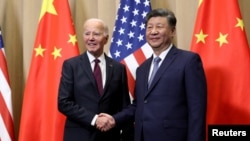President Joe Biden and PRC President Xi Jinping met on the sidelines of the Asia-Pacific Economic Cooperation summit for what is likely their final meeting. “We are the most important … relationship in the entire world. And how we get along together is going to impact the rest of the world,” said President Biden before the two spoke.
National Security Advisor Jake Sullivan told reporters after the meeting that the two leaders “conducted a lot of business in areas both where we are making progress and in areas where there are profound differences … And the two sides did not shy away from the more direct and difficult conversations where the two sides don’t agree,” he said.
One area at issue was the dangerous development of the Democratic People’s Republic of Korea’s sending troops to Russia to help Putin’s war against Ukraine; another was the DPRK’s direct provocations against the Republic of Korea. President Biden pointed out the PRC should use its influence with the DPRK to prevent further expansions of conflict. Advisor Sullivan said, “It’s not a sufficient answer to simply say, ... ‘There’s really nothing we can really do about it.’”
Another issue of contention was the topic of U.S. export controls on advanced semiconductors with national security applications. While President Xi raised his concerns over the controls, President Biden reinforced the rationale for the U.S. policy, which, said National Security Advisor Sullivan, “has protected America’s national security and enhanced our innovation edge, and we will continue to support that … until the end of this term, and we will continue to advocate to the next team that they carry forward with this policy.”
Areas where the two countries have made progress and where their interests align were also discussed, noted Advisor Sullivan, from sustaining military-to-military communication to avert potential miscalculations, to counternarcotics, to the climate, to Artificial Intelligence. The two leaders affirmed the need to address the risks of AI systems, and both agreed that there should be human control over any decision to use nuclear weapons.
President Biden, said National Security Advisor Sullivan, is determined that the current transition period between the outgoing and incoming U.S. administrations be smooth, so that the U.S.-PRC relationship can be passed off to the new administration “on stable terms. ... [T]he two leaders have an obligation,” he declared, “to make that happen.”






